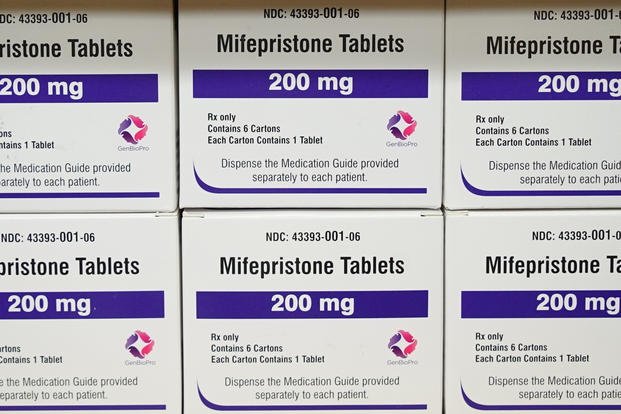More than a decade ago, the now controversial medication mifepristone showed promise for alleviating symptoms of service-related post-traumatic stress disorder in men.
A new study published Tuesday, however, counters previous research, determining that, in most cases, the drug used in medication abortions currently facing judicial review in the U.S. court system is no more effective for treating military PTSD than a placebo.
Results of a randomized clinical trial released Tuesday in JAMA Network Open found that, while veterans with chronic post-traumatic stress disorder with no history of a traumatic brain injury saw some improvement in their symptoms after taking mifepristone, those with a lifetime of PTSD and TBI were worse off at follow-up appointments than those who took a placebo.
Read Next: Meet the New Senior Enlisted Leader of the Space Force
The Department of Veterans Affairs researchers said that while the improvement seen in those without TBI may warrant additional research, overall, the study, which was conducted to determine the safety and effectiveness of the treatment, did not support an argument for broader research.
"This study did not detect a signal for efficacy for mifepristone at 600 [milligrams per day] in male veterans with chronic PTSD. Thus, this study does not support a phase 3 trial of this population," wrote the researchers, led by Dr. Julia Golier, chief of psychiatry at the VA Medical Center in the Bronx, New York, referring to large-scale clinical trials.
It may seem odd that a drug at the heart of the medication abortion debate in the U.S. would be considered as a possible treatment for PTSD, but it previously had demonstrated effectiveness in alleviating mental health symptoms in those who use it for its other purpose, to treat Cushing's disease, a hormonal disorder.
At low doses, mifepristone, a synthetic steroid, blocks progesterone uptake needed to continue pregnancies, making it an effective abortive when combined with another medication.
At high doses, it blocks uptake of cortisol and controls hyperglycemia in patients with Cushing's. As a result of treatment in patients with Cushing's, practitioners observed that those who also had a diagnosis of depression or psychosis saw their symptoms improve after taking mifepristone.
Given that track record, researchers theorized that the medication could be used to treat combat-related PTSD, and in 2012, a small study of eight male veterans found significant improvement in those who received the medication over a placebo.
Two types of antidepressants often are prescribed to treat post-traumatic stress disorder: selective serotonin reuptake inhibitors, including the brand-name drug Prozac, and serotonin-norepinephrine reuptake inhibitors. Those medications, however, have not been found to be "uniformly effective" for treating PTSD, hence the effort to find existing medications or new drugs to treat PTSD, according to Golier and the other researchers.
Various types of therapy to treat post-traumatic stress disorder have proven to be effective, such as cognitive behavioral therapy, prolonged exposure and eye movement desensitization and reprocessing therapy, but research shows that veterans often avoid psychotherapy or drop out for reasons such as stigma, distrust of its success or of their providers, or fear of losing security clearances or access to weapons.
The researchers said the vast number of veterans who have not been treated effectively for PTSD suggests "a need for a new approach." They hoped mifepristone might prove to be a solution.
They noted that their research had limitations, including that the study was conducted only on men, mainly out of concern for the impact of using a progesterone blocker on women, and that they had access only to 600-milligram doses and not larger 1,200-milligram dosages, which they theorized may have resulted in different outcomes.
Mifepristone has been used since 2000 as part of a two-drug regimen for medication abortion. Last year, anti-abortion groups filed a lawsuit charging that the drug, which is used in about half of U.S. abortions, is dangerous and was illegally approved by the Food and Drug Administration.
Last month, a U.S. District Court judge in Texas agreed with the plaintiffs and suspended its use; the U.S. Supreme Court subsequently placed a hold on that order while the case is appealed.
A three-judge panel of the 5th U.S. Circuit Court of Appeals is expected to review the case May 17.
By the end of the year, there may be another option for treatment of combat-related PTSD. The Multidisciplinary Association for Psychedelic Studies, or MAPS, is expected to file an application this year with the Food and Drug Administration to approve MDMA, also known as ecstasy or molly, for the treatment of PTSD.
In clinical trials of 90 veterans with PTSD, 80% of the patients who engaged in MDMA-assisted therapy showed improvement of their symptoms, with three-quarters of those achieving either complete remission or no longer having any symptoms.
-- Patricia Kime can be reached at Patricia.Kime@Military.com. Follow her on Twitter @patriciakime
Related: 'You Can Forgive Yourself:' Molly Helps Vets with PTSD, New Study Says













